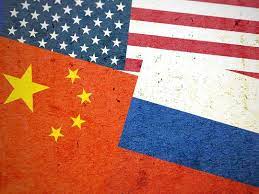Ramzy Baroud
Clearly, we live in an era of global conflict. The challenge is knowing where we are heading. There are the ideologues who see the world only in the language of black and white, thus approaching conflict through a zero-sum game mindset. It is that kind of thinking that often leads to a bipolar world order.
There are also the realists who understand the world essentially as a battleground between competing global powers. This is how multipolar worlds are often formed. And a third approach, which, for now, persists within the realm of intellect, envisions a just world that does not cater to the interests of the powerful at the expense of humanity. Once, the Non-Aligned Movement (NAM) served as a model for this kind of thinking. Starting in February 2022, however, the Russia-Ukraine war abruptly forced a rethink, especially among nations in the Global South that have justifiably felt wrongfully treated in the years of US-Western global supremacy.
Countries like Venezuela, Cuba and Algeria rushed to welcome the return of the great Russian ally. For them, an old world order was being restored. Countries like Mali, Burkina Faso and Niger seemed ready to ditch their Western allies, namely France, with the hope of joining the Russian camp. For them, the prospect of a better world order was at hand. And a third group remains undecided, undergoing political struggles within their own national borders or regions, for example, Sudan. From a strict geopolitical analysis, it is only ‘natural’ for the United States and its European allies to try to maintain their political dominance over the world. Sharing global resources might seem like a noble idea, but global competition is really predicated on egalitarian principles.
Equally, China and Russia did and will continue to expand their economic, military and strategic domains. No economic expansion is possible without such a pursuit. The conflict arises because, while new powers are expanding, old powers are fighting to block their strategic enlargement. Washington continues to resort to the same zero-sum strategy of yesteryears. A quick read of statements made recently by US President Joe Biden indicates that the US is not yet prepared to coexist with the global shifts. In a speech at the Oval Office on October 20, Biden spoke a language that perhaps only Americans can fully comprehend:
“We have to remember one thing: We’re the United States of America, for God’s sake. Think about it. We’re the United States.” For the rest of the world, this could only mean one thing: the US’ claim to world dominance is based on the sheer virtue of the very existence of the US as a country. For many nations, this logic is implausible. But Biden’s words are a rehash of similar statements made by past US presidents, secretaries of state and numerous top US officials throughout the years. “We are (..) the essential nation. We are the essential nation,” Biden repeated in his address to the nation, this time citing a previous statement made by former Secretary of State, Madeleine Albright. The ‘essentiality’ here is hard to fathom, let alone analyse. For the powerful, the world is run through sheer interests. For the weak, solidarity is a critical factor.
Oddly enough, it was former US Secretary of State Henry Kissinger who is often quoted as saying that “America has no permanent friends or enemies, only interests.” In other words, American allies – or French, or British allies for that matter – will simply cease to be so if they realise that such an alliance is no longer essential to their national interests, or to the well-being of their peoples. Compare recent statements made by Biden to those made by Russian President Vladimir Putin and Chinese President Xi Jinping. First, Biden. The US President wants to maintain the old world order, based on the following logic: “American leadership is what holds the world together. (..) American alliances are what keep us, America, safe. American values are what make us a partner that other nations want to work with.” Second, Putin. The Russian President understands what countries like Niger, Brazil and Iraq are looking. Hence, in his speech at the 2022 Moscow Conference on International Security, he said that the new “multipolar world” must be “built on international law, on fairer relations, that opens up new opportunities to combat common threats.”
Xi, as well, knows that this is not a battle of ‘values’, but of interests that are based on the respect for the sovereignty of nations and their collective quest for economic prosperity. “Ideological confrontation, geopolitical rivalry and bloc politics are not a choice for us,” Xi said on Oct. 18, in a speech at the opening of the Belt and Road Forum in Beijing. The Global South understands precisely what these words mean. While some nations have already made up their mind regarding where they belong in this new world order, others are still watching and listening, hedging their bets, in anticipation of radical changes that will surely occur.
Gulf News







